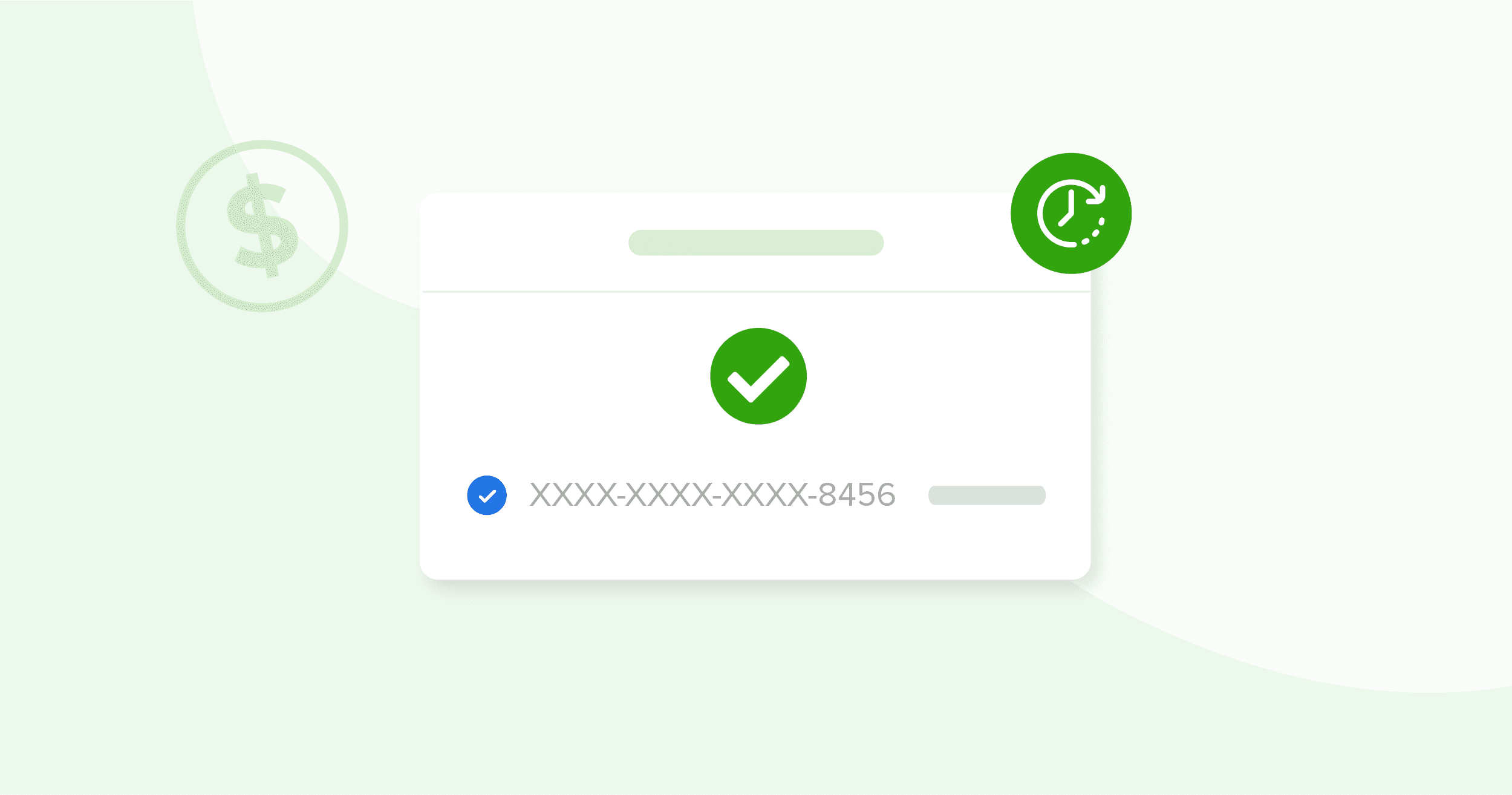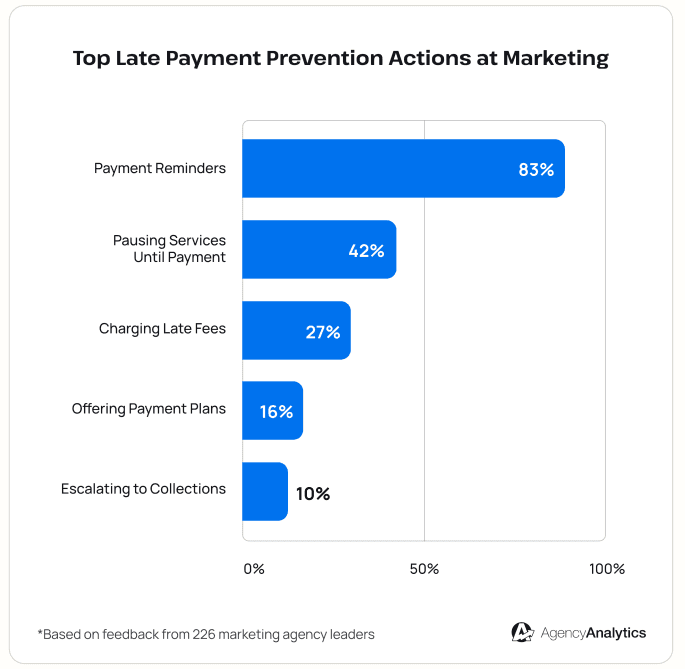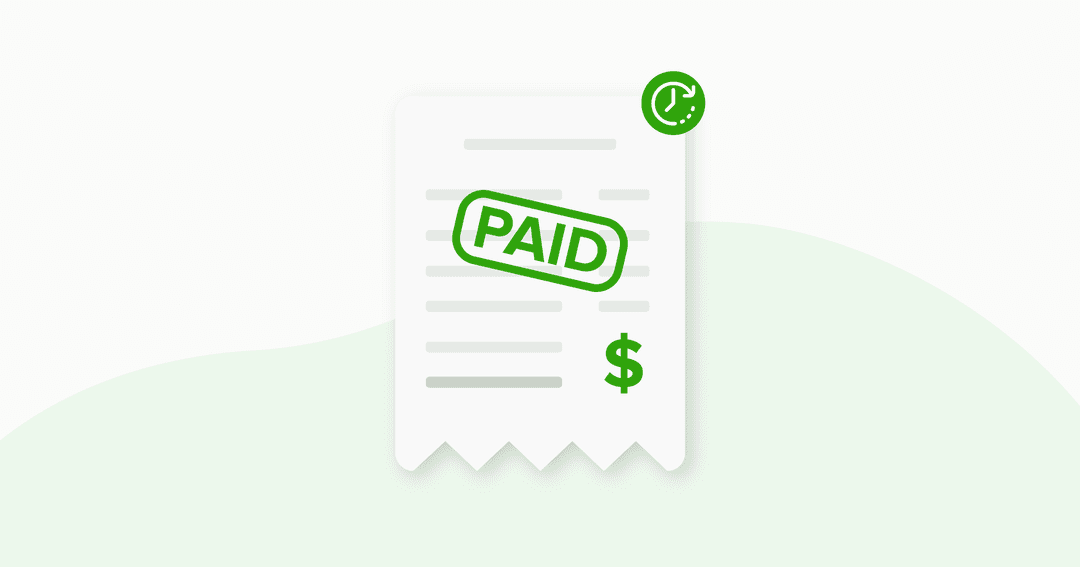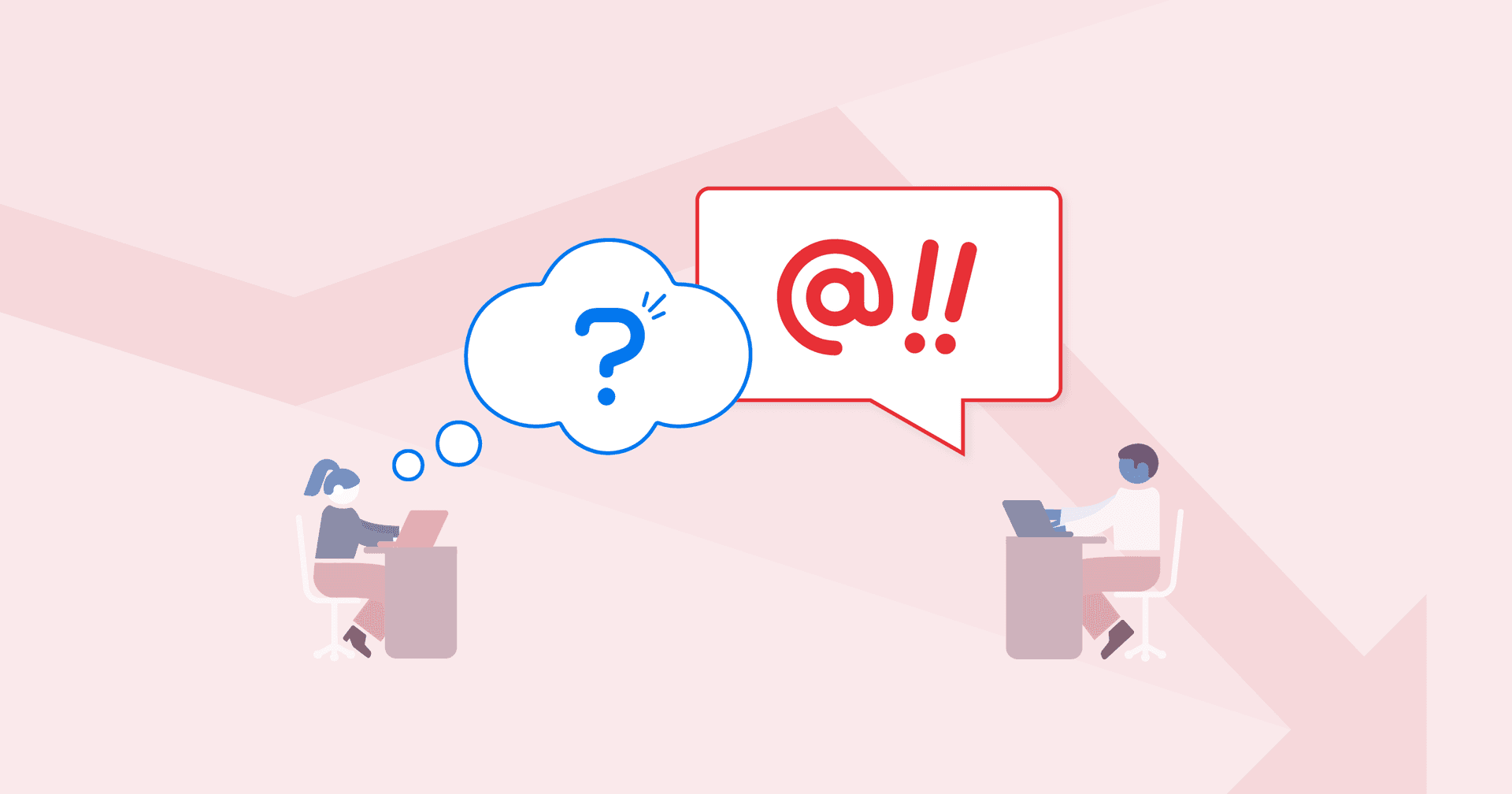Table of Contents
Table of Contents
- Why It’s Important For Your Clients To Pay On Time
- How To Get A Client To Pay Your Invoice On Time
- What To Do If a Customer Doesn’t Pay on Time?
- Do You Have a System In Place For Follow-Up On Late Invoices?
- How Much Time Must Pass Before Sending Someone To Collections?
- The Bottom Line: Put It in Writing and Stay Proactive
7,000+ agencies have ditched manual reports. You can too.
Free 14-Day TrialQUICK SUMMARY:
Clients paying on time is necessary for maintaining cash flow and business stability. Many marketing agencies face late payments despite firm terms and conditions. Learn how to get clients to pay on time, such as implementing detailed contracts and clear payment milestones, to avoid cash flow disruptions and maintain financial health at your agency.
A Businesswire survey found that most U.S. small businesses have net 30 payment terms; a majority experience late payments well past the due date, with a quarter (25%) having to wait between 20-30 days past the payment due date.
Irritating, isn’t it?
Every month you work your fingers to the bone, delivering results that clients benefit from practically immediately.
And then have to wait for weeks until your agency reaps the reward–hard-earned cash.
What’s worse is that most common ways to get clients to pay on time offer little help. While there are customers who have no issues paying on time, others choose to ignore your T&Cs (no matter how firm they are). And clients rarely reward you with immediate payment after delivering great work.
But does that mean you should do nothing to get clients to pay on time? Nope–quite the contrary.
Intrigued? Let’s get started then.
Ideally, every customer should pay their invoices on time. However, we don’t live in an ideal world, and eventually, a client will fail to pay. So, how do you resolve this situation when it arises?
In this post, we’ll outline unique strategies to trick clients into always paying on time by streamlining your payment process.
Why It’s Important For Your Clients To Pay On Time
As an agency owner, you know that cash flow is king. Money coming through the door keeps your business running and growing, which is why it’s so important to get paid on time by your clients.
We all expect to be paid promptly, but here are a few additional reasons why timely payment is vital for your business.
Your Agency Has Expenses, Overheads, and Cash Flow Needs
It should be clear that the running costs such as internet, office supplies, and payrolls won't cover themselves. Therefore, getting paid on time means you cover your expenses without delays.
Delayed payments from clients will push back your payroll and bill payments, which is not something you want to happen–you need to take care of your agency’s primary business needs.
You're Offering a Professional Service
You might have anxiety about that late payment conversation with your client, even if your agency depends on the cash flow. It’s understandable–there is always the worry that your client might leave your agency if you come across rudely.
However, the bottom line is that your agency provides a professional service and deserves prompt compensation. After all, top-tier service isn’t free!
Plus, your agency is allocating valuable time and resources, both of which could be reallocated to other clients or spent acquiring new business.
Allowing Consistent Late Payments Is Bad For Business
Unfortunately, some agencies make the mistake of allowing late payments repeatedly.
You may think you’re being nice to your clients by allowing them to slide on the payment deadline by a few days here or a week there, but you’re not doing them or your agency any favors.
By not requiring on-time payments, you are teaching your clients that it’s acceptable to pay at a later time. You’re also creating more pressure on your client’s cash flow because they now have overdue and pending invoices on their accounts payable.
How To Get A Client To Pay Your Invoice On Time

1. Start Charging Retainer Fees
Depending on how your agency operates, you might want to charge an upfront payment and send an invoice for the remainder of the fee (once the project is completed).
It’s a relatively simple pricing model to work and keeps everyone on the same page about the final price and deliverables.
However, it also leaves your agency vulnerable to cash flow problems resulting from late payments. If this becomes a concern, consider switching to a retainer fee model. Offering early payment incentives, such as a 5% discount, can encourage clients to pay on time and in full, securing payment before work is done and providing flexibility in managing the project scope.
There are many ways to calculate and charge a retainer fee. The simplest way is to divide the price for the work you need for a client by the months you’ll be doing it.
For example, if your project total is $4500 and you’ll be working on it for three months, then you could charge the client $1500 each month.
A more advanced way takes your costs, employees, taxes, and many other factors into consideration.
Regardless of which option you choose, the benefits of a retainer model are clear:
You get paid a set monthly amount for the project duration, which helps you predict cash flow and manage your agency’s growth.
Because this fee model requires clients to pay on time, your agency gets guaranteed payments. In most cases, companies require each retainer payment either upfront or immediately at the end of the month before commencing work.
2. Productize Your Services
Productizing a service takes the retainer model to a whole new level. Instead of just converting project-based fees into more predictable and regular revenue, package your service into a systematized, monthly product-like offering. In a productized model, your agency offers a pre-set, packaged service for a flat monthly fee, similar to how many SaaS companies operate.
And just like SaaS companies, you get paid upfront for each month you work with a client.
Many productized companies use Stripe or another similar service to charge clients’ credit cards each month automatically.
No net 30 payment terms. No fuss. No delays.
3. Collect Deposits
Clients can change or abort any project without investing money in a project at any time. After all, what have they got to lose?
That’s why collecting deposits act as a guarantee of a future payment. A deposit confirms a client’s commitment to the project and signals that they’re able to pay.
However, agencies often charge deposits that aren’t high enough to warrant an on-time payment.
For example, a client who paid you only 25% upfront may not necessarily be incentivized to part with the remaining 75% of the outstanding payment. After all, it’s still quite a substantial amount of money.
But if you charge a heftier deposit–say 50% or even 70%–they’re left with just a tiny chunk to pay. And from a client's perspective, it’s not substantial enough to hold the payment or defer the money elsewhere.
So, if you’re uncomfortable with charging a monthly retainer fee or productizing your agency’s services, consider increasing your deposit requirements significantly.
Collecting at least half of the money upfront will secure your business in case of late payment. A hefty deposit will provide you with a float of money that could get you through to the project’s completion.
4. Run Credit Checks
FACT: Running credit and payment checks could help prevent many unpleasant cash flow problems.
While it isn’t a strategy to trick clients into paying on time, it’s a way to help you avoid working with clients known for late payments. Companies like CreditHQ offer services that allow you to check how likely a new client will pay you.
Feedback like this could help you assess whether you even want to work with a particular company. If they’re known for being good payers and always settling their bills on time, it gives your agency reassurance to work by standard T&Cs.
If they’re typically late with settling vendor invoices, offer stricter terms, retainers, or milestone payments. You also have the option to look up their name on Google, ask your contacts if they have any information about them, and check for complaints on sites such as the Better Business Bureau.
5. Offer Discounts For Early Invoice Payments or Charge a Late Payment Fee
Budget-conscious clients will appreciate the ability to save money by paying on time.
However, if used incorrectly, some strategies cause more problems than they solve. For example, an promoting early payments discount may devalue the services your agency provides, which seems like a counterintuitive thing to do.
Suppose you prefer to incorporate a “late payment fee” policy into your contract, this might scare potential clients away if not clearly outlined as to what constitutes a late payment. However, whether you use the term “discount” or fee when you invoice clients, this provides a financial incentive for clients to pay on time. Adding a small “2/15 Net 30” to their invoice is an easy way for your clients to believe that they are saving money just for being more attentive to their invoices.
You can also consider providing a discount for clients that pay in advance. With this method, your agency becomes more proactive and increases the likelihood of timely payments.
Agency Tip: Implementing payment reminders that call out the discount they will receive or the penalty they will incur based on the payment dates can help clients stay on track with their payments.
6. Automate Payment Collection
App integrations like Freshbooks and Stripe process payments directly from a client’s credit card at pre-scheduled intervals.
Even if your agency doesn’t take this payment route, automating your invoice system is still a good idea. This means setting up a system where customers receive automatic reminders when they haven’t paid their invoices yet. Setting up a bank account for automatic payments can streamline the payment process. Having a more streamlined and consistent system will be more reliable than depending on people to remember to pay their invoices.
This strategy might not work for every client or project type. But if you work on a retainer basis and require milestone payments or invoices at regular intervals, consider automating client billing.
As a bonus, automation frees up your time from manual invoicing and payment processing–a double win.
7. Offer Flexible Payment Methods
One of the simplest ways to improve prompt payments is to make it easier for clients to pay you in the first place. According to the 2025 Marketing Agency Benchmarks Report, most agencies accept a mix of payment methods—including:
Credit cards (86%)
ACH or direct deposit (78%)
Checks (51%)
Wire transfers (45%)
PayPal (33%)
By offering multiple options—including debit cards or online invoicing—you reduce friction and remove barriers that slow down your invoice process. When clients can pay online, they’re less likely to forget or delay payments.
Flexible payment methods also signal professionalism and make your agency easier to work with—strengthening client relationships and setting the stage for a win-win situation where payments are made on time, every time.
8. Make Your Invoice Easy To Understand And Pay
If you want to get paid on time, it is essential to have a clear and easy-to-understand invoice. This way, customers will not be confused about how much they owe and for what, and they will be more likely to pay on time.
When creating an invoice for your business, it is crucial to double-check for mistakes, pick templates with clean layouts, and include descriptions of all products or services listed. Remember, your invoice is a marketing tool that reflects your agency’s level of professionalism.
Also, consider when to send invoices, depending on your client’s billing cycle. For example, if you invoice weekly or every two weeks, research suggests that invoices sent on the weekend will be paid faster. If you bill monthly, invoices sent on the first of the month are more likely to be paid on time.
9. Send Your Invoice Earlier
Your invoice might include multiple sections such as “Net 30”, “Invoice date,” and “invoice due date.” As such, some of your clients might understand your invoice to be due in 30-days rather than today.
Remember, you’re not the only business that they are dealing with. It’s confusing if your clients receive other invoice reminders and automatic payment charges. Perhaps they are late on payment because they’re consolidating all their invoices and sending them out on a particular day of the month. Whatever it may be, discuss it with your client to avoid any confusion.
10. Include Late Payment Fees in Your Contract
Sometimes, clients need a little extra motivation to meet their payment deadlines. A written agreement that clearly outlines charges for late payments helps prevent misunderstandings and sets clear expectations.
Include a section in your contract detailing your payment policy, such as:
When payment is due (e.g., within a certain period after sending invoices)
What constitutes overdue payments
Any additional costs or interest that apply when clients pay late
This transparency keeps your client’s mind focused on accountability and ensures both sides understand the terms before any billing period begins. It’s also an effective reminder that your agency’s hard work and expertise deserve timely compensation.
When combined with friendly reminders and a regular payment schedule, these clauses go a long way toward getting clients to pay in a timely manner—without damaging your business relationship.
11. Maintain Good Relationships With Clients
It's essential to have clients who see you as more than just a task doer. A client relationship is not only about providing services but also building a working relationship, bringing tremendous value, and differentiating yourself from other agencies.
Anyone may look at your agency’s services and find ten similar businesses just a click away. Therefore, your agency should focus on fostering that client relationship and having a great rapport. Win your client's hearts by tackling their pain points. When you put in the extra effort, these clients are more likely to pay you on time because they won’t want to risk losing you as a partner in their growth.
Be friendly with your customers, let them know they are valued, and show them they are not just another client. Most agencies focus too much on getting more clients than increasing client retention. Of course, it’s not about talking your way to getting paid but showing them the results of your work and making them appreciate your performances.
Be proactive with client reporting and have open communication so it won’t be as challenging to chat about late payments (if it ever occurs).
12. Offer Different Payment Schedules Or A Payment Plan
Cash flow challenges happen on both sides of the table. For clients, even the most committed partnerships can be strained when budgets tighten. Offering flexible payment schedules or installment options helps relieve that pressure—while ensuring your agency continues to get invoices paid on time.
A few things to consider:
Try switching from a single monthly invoice to biweekly or milestone-based billing. Breaking the total into smaller amounts makes payments feel more manageable and predictable.
Outline your regular schedule in the contract and communicate clearly when each payment is due.
Consider a simple payment plan for longer projects—especially if clients prefer to pay half upfront and the remainder after key deliverables
What To Do If a Customer Doesn’t Pay on Time?
What happens if you take these proactive measures and a customer still hasn't paid by the due date?
Send a Friendly Reminder Email
If someone doesn't pay their invoice, the first step should be to remind them in a friendly way. They may have forgotten, so give them a chance to make up for it. Also, ask if anything prevents them from paying, such as dissatisfaction with your company's services or a financial limitation.
Make a Phone Call That Is Polite But Assertive
If someone hasn't paid a bill even after you've sent them a reminder, it's time to give them a call. Be polite but firm, remind them how long ago the bill was due, and offer a few different ways to pay.
Come To a Mutually Beneficial Agreement
If you're not getting paid what you're owed, find a compromise that makes both parties happy.
If your customer is having financial issues, offer to split the invoice into multiple smaller chunks, so the payments are more affordable. If your customer is unhappy with the services rendered, evaluate their feedback and offer them a discount or additional services if necessary.
Pause Services Until Payment Is Received
If a client’s invoice becomes overdue, it’s time to protect your agency’s resources. The 2025 Marketing Agency Benchmarks Report found that 42% of agencies pause services until payment has been received—making it one of the most effective late-payment prevention strategies.

This approach isn’t about being harsh; it’s about balance. You’re reinforcing the value of your team’s time while maintaining professionalism. Clearly communicate this policy in your payment schedule or contract, so clients know in advance that consistent payment schedules are essential to ongoing work.
Speak With a Lawyer Before Taking Any Legal Action
Talk to a lawyer if someone owes your agency money and cannot fulfill the payment. A lawyer is the right person to give you more information about legal implications and the best way forward.
Do You Have a System In Place For Follow-Up On Late Invoices?
Like most agency owners, you probably don't have a system for follow-up on late invoices, which will cause issues down the road. Here are a few simple steps to ensure your invoices are paid on time.
Day 1—After Payment Due Date
If you haven't received payment by the due date, see if your client has viewed your invoice. Invoice software, short link analytics, or email analytics are useful to determine if your client has viewed or opened your email. Either way, send a polite email reminder mentioning that perhaps the invoice has gotten lost in the shuffle. The invoice software you choose makes it easy to send automated reminders to your clients.
Don’t assume anything. It might be that your client opened your email, had an emergency, or got caught up with other important tasks.
Try sending an automated reminder a week before the invoice is due to give them a heads-up!
Day 15—Two Weeks Late
If your invoice is two weeks late, it's an excellent time to give your client a polite phone call. Confirm they have received the invoice and see if there are any questions.
Day 30—One Month Late
This may feel rude, but that doesn’t mean you should be–keep calm and stay professional in your follow-up. If you have already spoken with the client, re-send the invoice with any new charges, reference the earlier conversation, and any previously mentioned plans to send payment.
You could also begin assessing late fees at this stage, but only if this was explained in their client onboarding. Hitting a customer with an unexpected late fee could cause more disagreement than it’s worth. It's better to state your terms for late payments up front, itemize them on the next bill, and be clear about your agency’s payment terms.
If you are dealing with your client’s accounting department, it might be time to get your client involved directly, as they have a vested interest in timely payment and continuing work.
Send an e-mail to politely let your client know that you will have to stop working on current projects until the bills are paid. And remind them that any creative work belongs to you until you have been paid for it.
Day 60—Two Months Late
If 60 days have passed, sending a demand letter from your attorney is not unreasonable, but it should be the last resort.
We've been burned more than once by clients that we put our trust in to pay us and pay on time. Once legal gets involved, nobody wins, so it's better to get paid upfront for the work that you do or get a deposit to protect yourself from similar situations.
Molly Lopez, Founder & CEO, Sparo
If you’re struggling to collect payment on an invoice, you have a few options: using an invoice factoring agency, sending the bill to a collections agency, or writing the invoice off as bad debt.
None of these scenarios are ideal, but each option is worth considering.
To avoid such situations, it is crucial to include exact payment terms in your contract. This ensures that both parties are clear on deadlines and other important payment details, reducing the risk of misunderstandings.
How Much Time Must Pass Before Sending Someone To Collections?
If your client owes you money or has stopped responding to your outreach attempts, you have the option to hire a collections agency.
A collections agency is a company that will contact the person that owes your agency money and try to get them to pay. Once this approach is successful, they will take a cut of the collected money.
The typical time to send someone to collections is 90 to 120 days after they are overdue.
But note that the collection agency will take a hefty percentage of your invoice–between 20% to 40% or more. If you go to collections or a small claims court, you'll likely lose the customer–but it may be the only way if you can't be paid otherwise.
The Bottom Line: Put It in Writing and Stay Proactive
Getting invoices paid on time isn’t about luck—it’s about systems, clarity, and communication. Every agency needs a written agreement that spells out payment milestones, regular payment schedules, and acceptable payment methods.
Your contract should clearly define:
Payment deadlines and milestones (e.g., 40% down, 40% midway, 20% final)
A clear payment schedule within each billing period
Accepted options for online invoicing or debit cards
Terms for additional costs or late-payment penalties
Expectations around sending invoices and friendly reminders
Scope of work and deliverables
The best strategy is to think ahead. Set your terms, communicate them early, and use accounting software or an integrated reporting platform like AgencyAnalytics to keep client relationships strong and transparent.
When you outline every detail upfront—how clients will pay early, pay half, or stay on a regular schedule—you prevent friction, protect your agency’s revenue, and turn your billing process into a smooth, win-win situation for everyone involved.

Written by
Paul Stainton is a digital marketing leader with extensive experience creating brand value through digital transformation, eCommerce strategies, brand strategy, and go-to-market execution.
Read more posts by Paul StaintonSee how 7,000+ marketing agencies help clients win
Free 14-day trial. No credit card required.






